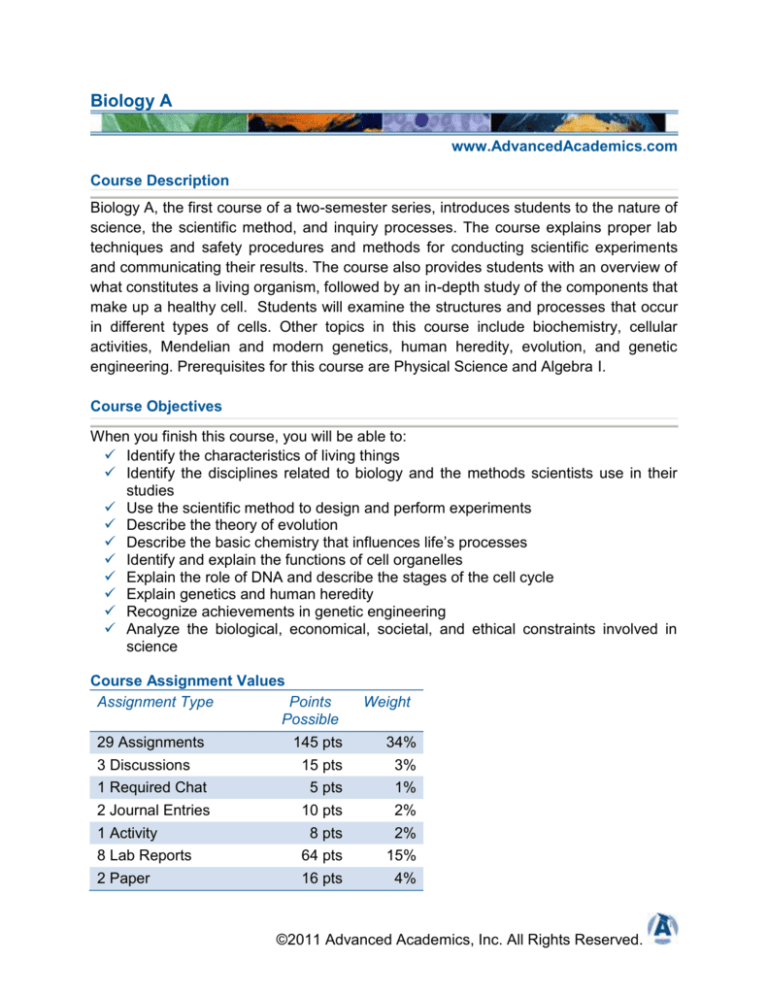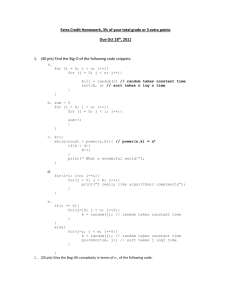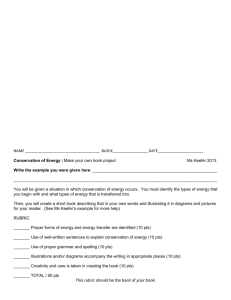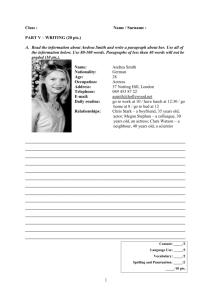
Biology A
www.AdvancedAcademics.com
Course Description
Biology A, the first course of a two-semester series, introduces students to the nature of
science, the scientific method, and inquiry processes. The course explains proper lab
techniques and safety procedures and methods for conducting scientific experiments
and communicating their results. The course also provides students with an overview of
what constitutes a living organism, followed by an in-depth study of the components that
make up a healthy cell. Students will examine the structures and processes that occur
in different types of cells. Other topics in this course include biochemistry, cellular
activities, Mendelian and modern genetics, human heredity, evolution, and genetic
engineering. Prerequisites for this course are Physical Science and Algebra I.
Course Objectives
When you finish this course, you will be able to:
Identify the characteristics of living things
Identify the disciplines related to biology and the methods scientists use in their
studies
Use the scientific method to design and perform experiments
Describe the theory of evolution
Describe the basic chemistry that influences life’s processes
Identify and explain the functions of cell organelles
Explain the role of DNA and describe the stages of the cell cycle
Explain genetics and human heredity
Recognize achievements in genetic engineering
Analyze the biological, economical, societal, and ethical constraints involved in
science
Course Assignment Values
Assignment Type
Points
Possible
Weight
29 Assignments
145 pts
34%
3 Discussions
1 Required Chat
15 pts
5 pts
3%
1%
2 Journal Entries
10 pts
2%
8 pts
2%
8 Lab Reports
64 pts
15%
2 Paper
16 pts
4%
1 Activity
©2011 Advanced Academics, Inc. All Rights Reserved.
Assignment Type
12 Unit Tests
Points
Possible
Weight
120 pts
28%
1 Midterm Exam
20 pts
5%
1 Final Exam
25 pts
6%
428 pts
100%
Course Totals
Suggested Course Schedule
The suggested time frame shown below is based on learning sessions. A learning
session is a 45-minute period of time. This course should take approximately 90
learning sessions to complete, but this schedule is just a suggestion. You may work on
each unit at your own pace, completing as many learning sessions as you’d like in one
sitting. However, keep in mind that you must finish the entire course within the time
specified by your school district.
Learning
Session
1-10
11-20
21-30
Content Covered
Unit 1: The Nature of Science
This unit describes how the scientific method is used to explore the world
of biology. This unit also introduces using the metric system, taking
measurements, how to write a science report, and proper laboratory
safety.
In this unit, there will be:
3 Assignments
15 pts
1 Paper
8 pts
1 Unit Test
10 pts
Unit 2: The Science of Biology
This unit describes the characteristics of living things, the different
branches of studying in biology, and the tools scientists use to study
organisms.
In this unit, there will be:
2 Assignments
10 pts
1 Unit Test
10 pts
Unit 3: Basic Chemistry
This unit explores concepts of basic chemistry and the properties of
matter. We will understand the structures of substances involved in
phase changes, atomic structure, chemical bonding, and introduce
©2011 Advanced Academics, Inc. All Rights Reserved.
chemical reactions. We will also use the periodic table to identify
elements. The properties of matter will be used to distinguish between
elements, compounds, and mixtures.
In this unit, there will be:
3 Assignments
15 pts
1 Unit Test
10 pts
31-40
Unit 4: The Chemistry of Life
This unit examines the properties of water, acids, and bases, and
important biological molecules. We will analyze the effects of catalysts in
biological reactions in a laboratory activity. This unit focuses on the
properties of water and carbon and what makes these substances unique
in biology.
41-50
In this unit, there will be:
2 Assignments
10 pts
1 Lab Report
8 pts
1 Unit Test
10 pts
Unit 5: Cell Structure and Function
This unit presents an introduction to cellular structure and function. We
will understand the levels of organization of structures in the human
body, how substances transport in and out of cells, and explain how cell
theory developed.
51-60
In this unit, there will be:
2 Assignments
10 pts
1 Unit Test
10 pts
Biology A Midterm Exam
20 pts
Unit 6: Cell Energy
This unit introduces energy processes in cells, including photosynthesis,
glycolysis, and cellular respiration. Both aerobic and anaerobic
respiration will be examined in this unit, and the relationship between
photosynthesis and cellular respiration are explained.
61-70
In this unit, there will be:
3 Assignments
15 pts
2 Lab Reports
16 pts
1 Activity
8 pts
1 Unit Test
10 pts
Unit 7: Nucleic Acids and Protein Synthesis
©2011 Advanced Academics, Inc. All Rights Reserved.
This unit introduces the molecules that contain the genetic information of
living organisms. The structures of DNA and RNA will be described and
the processes involved with these molecules, such as replication,
transcription, and translation, will be explained.
71-80
81-90
In this unit, there will be:
2 Assignments
10 pts
2 Lab Reports
16 pts
1 Unit Test
10 pts
Unit 8: Cell Growth and Division
This unit outlines the stages of cellular growth and division in mitosis.
In this unit, there will be:
3 Assignments
15 pts
1 Lab Report
8 pts
1 Unit Test
10 pts
Unit 9: Genetics
This unit introduces the basic concepts of genetic inheritance. We will
analyze the tools geneticists use to determine the various genetic
probabilities of offspring. This unit will emphasize the contribution of
meiosis to genetic variability, and compare mitosis and meiosis.
In this unit, there will be:
3 Assignments
15 pts
1 Lab Report
8 pts
1 Unit Test
10 pts
Unit 10: Human Heredity
This unit describes the inheritance of human traits and genetic disorders.
In this unit, there will be:
2 Assignments
10 pts
1 Unit Test
10 pts
Unit 11: Evolution
This unit describes the theory of evolution and its implications. We will
investigate how the theory developed, evidence for evolution, and the
association between genetics and this process.
In this unit, there will be:
2 Assignments
10 pts
1 Discussion
5 pts
©2011 Advanced Academics, Inc. All Rights Reserved.
2 Journals
10 pts
1 Unit Test
10 pts
Unit 12: Genetic Engineering
This unit introduces selective breeding, mutation, and the science of
genetic engineering. We will describe and analyze the different methods
and achievements of genetic engineering, and the ethical implications
behind this process.
In this unit, there will be:
2 Assignments
2 Discussions
1 Paper
1 Required Chat
1 Lab Report
1 Unit Test
Biology A Final Exam
10 pts
10 pts
8 pts
5 pts
8 pts
10 pts
25 pts
Privacy Policy
No member of the Advanced Academics staff is authorized to release student
information without the written permission of the student’s parent or legal guardian.
Names, images, and/or class work of Advanced Academics students will not be
published in print, video/film, or on our public website without written student and
guardian consent.
Disability Statement
If you have a disability or condition that may affect your ability to succeed in this course,
please contact your teacher. It’s important that you discuss the problem with him or her
so accommodations may be made to give you every opportunity to perform well. Your
teacher and virtual school program coordinators are committed to helping students with
disabilities succeed, and every request will be treated with respect and confidentiality.
©2011 Advanced Academics, Inc. All Rights Reserved.








